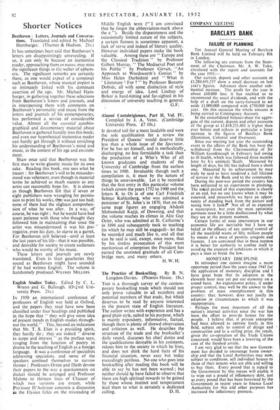Shorter Notices
Beethoven : Letters, Journals and Conversa- tions. Translated and edited by Michael Hamburger. (Thames & Hudson. 21s.) IT has sometimes been said that Beethoven's letters are disappointingly unrevealing. If so, it can only be because an inattentive reader, approaching them en masse, may miss the significant things in t1.1a welter of ephem- era. The significant remarks are certainly there, as one would expect of a composer such as Beethoven, whose musical import is intimately ntimately linked with his dominant assertion of the ego. Mr. Michael Ham- burger, in gathering together these selections from Beethoven's letters and journals, and in. interspersing them with comments on Beethoven's personality and music from the letters and journals of his contemporaries, has performed a service of considerable value. Almost all the essential autobio- graphical and documentary material about Beethoven is gathered handily into this book; and even our hypothetical inattentive reader can hardly get through it without enriching his understanding of Beethoven's mind and music, in the context of his age and envircin- ment.
Shaw once said that Beethoven was the first man to write gloomy music for its own sake. Reading this book, one sees what he meant : for Beethoven's will to be misunder- stood was vehement, even though in material terms he achieved as much success as any artist can reasonably hope for. It is almost as though Beethoven felt that if seven or eight publishers were wrangling for permis- sion to print his works, that was just too bad; none of them had the slightest comprehen- sion of what he was after. In a way, of course, he was right ; but he would have had scant patience with those who thought they followed him in maintaining that since 'the artist was misunderstood it was his pre- — rogative, even his duty, to starve in a garret. For Beethoven still believed—until at least the last years of his life—that it was possible, and desirable for society to create audiences who would be worthy of his music.
These letters and journals are newly translated. Even in their gaucheries they sound as Beethoven might have sounded if he had written English. The volume is handsomely produced. WILFRID MELLERS.


































 Previous page
Previous page